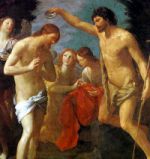Fathers of the Church
Epistle XLII: to Eulogius, Patriarch of Alexandria
by Gregory the Great in 603 | translated by James Barmby, D.d
Gregory to Eulogius, &c.
We return great thanks to Almighty God, that in the mouth of the heart a sweet savour of charity is experienced, when that which is written is fulfilled, As cold water to a thirsty soul, so is good news from a far country (Prov. xxv. 25). For I had previously been greatly disturbed by a letter from Boniface the Chartularius, my responsalis, who dwells in the royal city, saying that your to me most sweet and pleasant Holiness had suffered from failure of bodily sight. From this letter I was smitten by heavy sorrow. But suddenly, by the prospering grace of our Creator and Redeemer, I received the epistle of your Blessedness, and, learning that the bodily trouble of which I had heard was cured, I rejoiced exceedingly, since gladness of heart succeeded which was as great as the bitterness of the sadness which had come before. For we know that, with the help of Almighty God, your life is the health of many. For sailors sail secure through the waves when an instructed and skilful steersman sits at the helm. Moreover in my joy for your health I have this additional cause for exultation, that I have learnt how through your mouth the enemies of the Church are decreased in number, and the flocks of the Lord multiplied. For through the ploughshare of your tongue corn increases daily, and is multiplied in the garners on high; so that in you we rejoice that what is written is fulfilled, Where there is much increase, there is manifest the strength of the oxen (Prov. xiv. 4). Whence we gather plainly that the more you bring back fugitives to the service of Almighty God, the more merit you have with Him. And by how much the more merit you receive, the more fully can you obtain what you ask for. I beseech you therefore to pray the more earnestly for me a sinner, since both pain of body, and bitterness of heart, and immense ravages of mortality among the swords of so many barbarians, afflict me exceedingly. In the midst of all these things it is not temporal but eternal consolation that I require, which of myself I am not able to win by prayer, but which I trust that I shall obtain by the intercessions of your Blessedness. Last year I received no letters from your Holiness, and I was much distressed. It is true that your blessing, which you sent without a letter, was both given and received. But, since your tongue delights me more than your gifts, I was less gratified than I might have been by what was given. But I directed our common son, the deacon Epiphanius, to write to Alexander and Isidore, deacons of your most holy Church, to acknowledge the receipt of what had been sent.
I wrote to you, further, that I had got ready large pieces of timber for making masts and rudders, but that the small ship which had come could not carry them; and you have since written nothing in reply. Wherefore, if you need them, write to our common son Boniface, whom we are now sending as our representative (responsalem) to the royal city, that he may send me word that they may prepared, and that they may be found ready when your Blessedness shall send for them.
Furthermore, we have sent you a small cross, in which is inserted a blessing from the chains of your lovers the apostles Saint Peter and Saint Paul; and let this be continually applied to your eyes, seeing that many miracles have been wont to be wrought through this same blessing.
May Almighty God inspire the heart of your Blessedness to be careful to pray for me continually, and may He protect you and all yours with His right hand, and after ninny courses of years bring you to the heavenly kingdom.
We have received, corresponding with your description of them, the blessings of Saint Mark, sent to us by your most blessed Fraternity, and we return thanks for your kindness, since from these outward things we learn what you are towards us inwardly.
Taken from "The Early Church Fathers and Other Works" originally published by Wm. B. Eerdmans Pub. Co. in English in Edinburgh, Scotland, beginning in 1867. (LNPF II/XIII, Schaff and Wace). The digital version is by The Electronic Bible Society, P.O. Box 701356, Dallas, TX 75370, 214-407-WORD.






